Current as of: January 20, 2026 - 22:59

Jordan: Culture & Nature In Depth Trip Notes
- Ways to Travel: Guided Group
- Destination: Jordan
- Programmes: Culture
-
Activity Level:
2 out of 7 - Easy & Moderate
- 12 Days: Land Only
- Ages: 16+
- Trip Code: AXD
- Carbon Footprint: 30.9kg CO2e
Trip Overview
Visit all of Jordan’s Unesco sites, plus nature reserves and hidden treasures along with the classic highlights
This 12-day trip to Jordan is a great way to appreciate all the country has to offer. We visit some of the less explored archaeological sites, stay in lodges and cabins in nature reserves run by Jordan’s Royal Society for the Conservation of Nature away from the usual tourist centres, try home cooked food and of course visit all the main highlights such as Petra, Wadi Rum and Jerash along the way.
At a Glance
- Accommodation: 2 Superior nights (lodge/cabin), 7 Classic nights (5 hotel, 2 lodge/cabin), 1 Simple night (Bedouin camp). Cabins are run by Jordan’s Royal Society for the Conservation of Nature.
- Travel by air-conditioned minibus and 4×4 in Wadi Rum
- Group normally four to 16, plus leader. Minimum age: 16
Highlights
- Enjoy two full days in Petra, the Red Rose City
- Take a four hour 4x4 tour of Wadi Rum
- Visit desert castles, steeped in centuries of history
- Explore the Roman city of Jerash
- Take in views of the Sea of Galilee from Gadara ruins at Umm Qais
- Spot migratory birds in the Azraq Wetlands
- Float in the Dead Sea in a quiet spot away from most hotels
- Visit all six of Jordan's Unesco World Heritage Sites
Is This Trip for You?
This trip is graded Activity Level 2 (Easy & Moderate). For more information on our trip gradings please visit the Activity Level Guidelines page. If you have any queries about the difficulty of the trip please do not hesitate to contact us.
Although this is a cultural trip, some days (such as those in Petra) can be long and tiring. All visits to Petra require a reasonable amount of walking, and to do the optional 850 steps up to the monastery, or the climb up to the High Place of Sacrifice, you should have a good level of fitness. Your leader can provide you with further advice about these hikes. It is not advisable to do the High Place of Sacrifice if you suffer from vertigo, as there are some very steep, narrow steps and cliffs. The leader will show where the route to the High Place of Sacrifice starts, but does not accompany people wishing to take this route.
While camping in Wadi Rum, please be aware that, while the campsite does have plumbed toilets and showers, it is basic and hot water may be limited. Our private Exodus camp is, however, often mentioned as a trip highlight by many of our guests.
In very rare instances, we may need to amend the order of the itinerary, but we will ensure that all the elements of the itinerary are still included and site visits are of the same duration.
Water safety: This trip includes time by a lake, river or sea, where there may be opportunities to swim. You should always seek local advice before deciding whether to swim. Open-water or wild swim spots should be treated with extreme caution. Information on how to keep yourself safe while swimming is shown here.
Ramadan: The holy month of Ramadan is expected to run from 17 February to 19 March 2026. One of the most important periods in the Islamic calendar, it is a special time to visit a Muslim country. Our tour leaders and drivers choose to work at this time so we continue to run trips; however, their energy levels may be slightly lower than normal. Many tourist sites, restaurants and shops run an amended schedule, but your tour leader knows how to adapt the itinerary to experience all the inclusions on this trip and maximise your experience during this special time.
Adult min age: 16
Min group size: 4
Max group size: 16
Itinerary
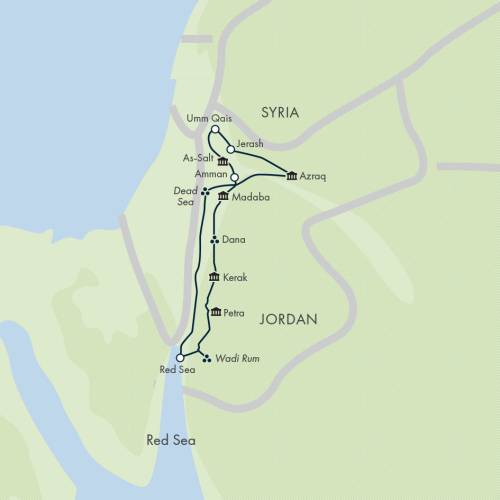
Land Only
- Start City: Amman
- End City: Madaba
Land Only Itinerary
Welcome to Amman, Jordan’s vibrant capital, where our adventure begins. Complimentary transfers are provided today from Queen Alia International Airport (AMM) to our start hotel. As many flights arrive later in the evening, no activities are scheduled today, allowing you time to get some rest for the experiences ahead.
Want more time in Amman? Secure pre-tour hotel nights through your sales representative.
Accommodation: Hotel Khan Khediwe (or similar)
After breakfast, say salaam (hi) to your tour leader and fellow travellers, when we gather as a group to get to know each other and learn more about the adventures ahead. Afterwards we head out to explore Amman around mid-morning.
We leave the hotel and head on foot to the Roman amphitheatre. Constructed in the second century, when Amman was called Philadelphia, the amphitheatre is built into a hillside. We then continue by vehicle to the ruins of Amman Citadel, which sits on the city’s highest hill. The site has been inhabited by various civilisations from the Bronze Age onwards and there are Roman, Byzantine and Umayyad structures visible today.
We’ll continue to the Jordan Museum. The largest museum in the country is dedicated to the history and cultural heritage of Jordan. Permanent exhibits include the Ain Ghazal statues, the earliest large-scale human figures and some of the Dead Sea Scrolls.
Accommodation: Khan Khediwe (or similar)
We leave Amman early this morning and drive about an hour to the town of As Salt which is built across three hills. The town has been settled since at least the Iron Age and is a UNESCO World Heritage Site as a Place of Tolerance and Urban Hospitality. In the final 60 years of the Ottoman period, the region was settled by merchants from Syria, Nablus and Lebanon. The lack of segregation between Christians and Muslims as the city developed forms part of the reason behind its UNESCO status. While in As Salt, we’ll visit the As Salt Archaeological Museum, Abu Jaber Museum – one of the most significant historic buildings in Jordan and Al Hammam Street – famed for its shops and architecture and named after a popular 19th century bath house.
After a drive of about an hour and a half we reach Pella, an important city in Roman times. Most of the remains date to the Byzantine period. Following a fairly short visit, we continue our journey north to Umm Qais, about another hour away. On arrival in Umm Qais, we will have lunch (included) cooked by a local family and served in their home. This a feast of food from northern Jordan.
After lunch, we visit the ruins at Umm Qais, Gadara. In a spectacular situation with views to the Sea of Galilee and the Golan Heights, Gadara is a Decapolis city with many monuments covering a large area. It is a fascinating place to explore. From Umm Qais, we drive for a bit over an hour to Ajloun where we stay the night in comfortable cabins in Ajloun Forest Reserve, part of Jordan’s Royal Society for the Conservation of Nature (RSCN) Wild Jordan Project.
Accommodation: Ajloun Cabins
We start the day by visiting Ajloun Castle. This atmospheric 12th century Muslim castle was built under the rule of sultan and military leader Saladin. It was originally accessible only by drawbridge.
We drive to Jerash and visit the ruins of Gerasa. This was one of the 10 wealthy, self-governing cities of the Decapolis, and was famous throughout the Roman empire for the luxurious lifestyle of its inhabitants. Buried for centuries under blown sand, Jerash is Jordan’s largest and most impressive Roman site. There are colonnaded avenues, theatres and temples. The temple of Zeus is particularly impressive.
From Jerash, we drive for about two hours into Jordan’s eastern desert to the small town of Azraq and Azraq Lodge where we stay for the night. Part of the lodge was originally a 1940s British military field hospital. The staff at the lodge reflect the diverse population of Azraq and include Chechens, Druze and Bedouin. The buffet dinner is prepared by a local Chechen family.
Accommodation: Azraq Lodge
We start the day with a visit to Azraq Wetlands Reserve, an interesting site managed by the RSCN. The wetlands are an important stopover for migratory birds and there are a series of walkways and hides.
We visit Azraq’s large, black-basalt castle, which served as Lawrence of Arabia’s headquarters during the Arab Revolt. This is the first of several sites we visit today which together are known as the Desert Castles.
Qasr Amra is a Unesco site and is noted for its extensive fresco paintings, which cover virtually all the interior walls. The paintings include themes such as hunting, dancing, musicians, bathing, cupids, and personifications of history, philosophy and poetry. Next stop is at Qasr Kharana, thought to have been constructed during the Umayyad Dynasty. The purpose of the building is still the subject of debate with theories including a Crusader castle and resting place for travellers.
We head onwards to Iraq Al Amir. Here we visit Qasr Al-Abed, a pre-Roman construction thought to have been built by the Jewish Tobiad family as a villa or fortified palace. We will also visit the Iraq Al-Amir women’s co-operative. Established by the Noor Al-Hussein Foundation, the aim of the co-operative is to make the women involved financially independent. Hand-made paper, woven fabrics, ceramics and food are produced.
We travel onwards to our second Unesco World Heritage Site of the day – Bethany Beyond the Jordan, where Jesus of Nazareth is believed to have been baptised by John the Baptist. There are Roman and Byzantine remains including a number of chapels and churches and this is a site of Christian pilgrimage.
We end the day by driving along the shores of the Dead Sea, the lowest point on earth, to Mujib Chalets where we stay the night. The chalets are right by the shores of the sea and offer a calm and peaceful place for a dip in the salty waters away from the large hotels elsewhere along the Dead Sea shoreline.
There are approximately four hours of driving today.
Accommodation: Mujib Chalets
We begin with a drive of about 40 minutes to Al Numeira Environmental Association. The association’s mission includes raising the environmental awareness of the local community and the promotion of water conservation techniques. We’ll spend about 45 minutes here and then drive south towards Aqaba, a journey of about four hours. We’ll visit Berenice Beach, where we can spend a couple of hours at the Red Sea, before heading onwards to Wadi Rum, a further hour away.
The UNESCO World Heritage site of Wadi Rum consists of dramatic sandstone mountains rising from a sandy desert floor. It was here that Lawrence of Arabia and Prince Faisal assembled the Arab tribes for the attack on Aqaba in the First World War and also where sections of the 1962 epic film were shot.
We stay in a private Bedouin camp used only for Exodus guests where we enjoy Bedouin hospitality with a traditional dinner called zarb, which is cooked underground. After dinner, we learn about Bedouin culture and music.
Accommodation: Exodus Private Camp (permanent Bedouin camp)
Our Bedouin hosts take us for an approximately four-hour 4×4 ride to explore some of the highlights of the dramatic landscapes of the Wadi Rum protected area. We’ll sample some Bedouin tea along the way.
We have the option of taking a camel ride in Wadi Rum today (extra cost).
We leave Wadi Rum behind and drive to Wadi Musa, the town adjacent to the Petra archaeological site. The journey takes about two hours. On arrival, we’ll visit the Petra Museum in preparation for exploring the site itself tomorrow.
Hotel rooms in Petra are in high demand. As a result, standards and service levels tend to be more hit and miss than in places we stay elsewhere on this trip.
Accommodation: Standard hotel – see accommodation section for more detail
A small number of departures use a superior (4 star) hotel for the three night stay in Petra – these are identified in the Dates and Prices section: “Superior hotel in Petra”.
Enjoy two days exploring Petra. The so-called Red Rose City was hidden for centuries until the Swiss explorer Johann Ludwig Burckhardt rediscovered it in 1812. It was founded by the Nabateans, an Arab tribe that arrived here in the sixth century BCE. Building at Petra began in the third century BCE and continued through the Roman period, financed by taxes levied on the desert caravans. Two features of Petra are unique: firstly, it is a city made defensible by being built down a series of chasms, rather than on a hilltop. Secondly, it is built directly into the rock – beautiful red-and-yellow sandstone carved into the most impressive facades, which glow in the sunlight.
To enter Petra we must begin by walking down a narrow chasm, known as the Siq. Unveiled at the end is El Khazneh, the Treasury. This is just the first breathtaking sight of a remarkable day. Continuing to the city centre, we pass the houses and tombs of the rich citizens and the remarkable scale of the site begins to unveil itself. An optional walk can then be done up 750 steps to El Deir, the Monastery, with its superb facade topped by a huge urn.
On the second day, your guide will take you back into the site. You can either hike up to the High Place of Sacrifice (unaccompanied) or explore other parts of the city further. Only a few people attempt to visit the High Place as it can be quite arduous and is not recommended for those who are unsure of their fitness or are uncomfortable with heights. However, those who do make it to the top are rewarded with wonderful views over parts of the site visited on the previous day.
During our time in Petra, we usually have the option of dinner with a local family on one evening (payable locally).
Accommodation: Standard hotel – see accommodation section for more detail
We begin the day with a short drive to Little Petra. The purpose of Little Petra is not clear; however, archaeologists believe it was probably a suburb of Petra where visiting traders on the Silk Road may have stayed. Today we enter the Unesco World Heritage site of Wadi Rum, where dramatic sandstone mountains rise from the sandy desert floor. It was here that Lawrence of Arabia and Prince Faisal assembled the Arab tribes for the attack on Aqaba in the First World War and also where sections of the 1962 epic film were shot.
Next stop is Shobak Castle, about 45 minutes’ drive away along the King’s Highway. This Crusader castle was built in 1115 by King Baldwin I. The castle has catacombs, a watchtower, Christian carvings and Islamic tablets.
We continue along the King’s Highway for another 40 minutes to Dana Village. The village sits in the Dana Biosphere Reserve and dates to the 15th century with a mix of ruined and restored buildings. We take a walk through the village, through terraced gardens, passing craft workshops and seeing original Ottoman architecture. We stay the night in RSCN run accommodation in the village.
Accommodation: Dana Guesthouse
We leave Dana behind and drive for about two hours along the King’s Highway, a beautifully scenic route through the hills to Kerak. An ancient Crusader castle, Kerak is maze of dark halls and passageways. It rises imposingly above the town. On clear days views stretch to the Dead Sea and Mount of Olives in Jerusalem.
We drive onwards for about an hour and a half to Umm ar-Rasas. This little-visited Unesco World Heritage site was initially developed as a Roman military camp and grew into a town from the fifth century. It is unexcavated and has remains from the Roman, Byzantine and early Muslim periods. The ruins contain several churches and the impressive mosaic floor in the Church of St Stephen is a highlight.
From Umm ar-Rasas, we head to Madaba, about 45 minutes away where we visit St George’s Church. Here we admire the mosaic floor, considered the oldest map of Palestine in existence. We then make the short drive to Mount Nebo; from this 2,295ft (700m) high viewpoint overlooking the Dead Sea to Palestine and Israel beyond, Moses is said to have first seen the Promised Land.
Accommodation: Black Iris II
Breakfast marks our final meal, an excellent chance to reminisce about an adventure packed with excitement. To make your return journey home easier, there’s a free shared transfer back to Amman airport.
Alternatively speak to your sales representative about our range of extensions, including time at the Dead Sea.
Extend Your Trip
Jordan Dead Sea Hotels
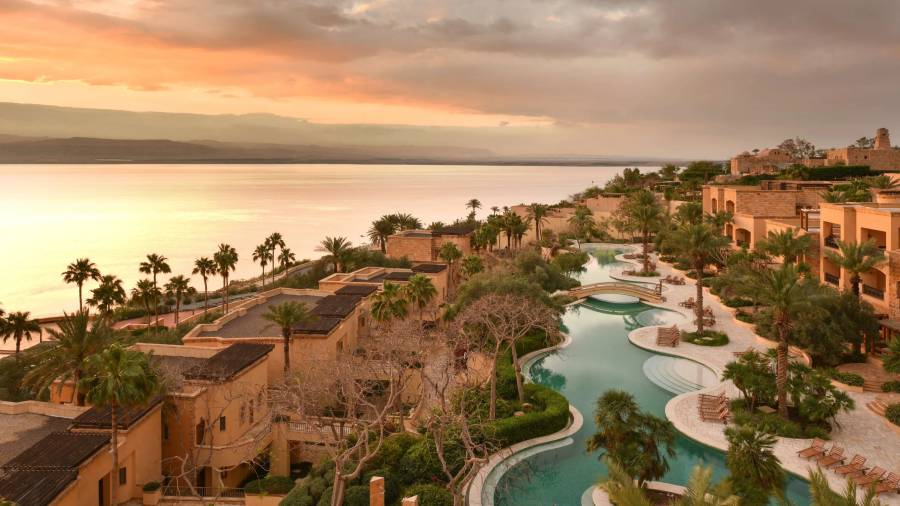
Floating effortlessly in mineral-rich waters framed by dramatic desert landscapes, the Dead Sea is one of the world’s most unique natural wonders. Extra nights here give you time to relax, enjoy the therapeutic benefits of the sea and unwind in a truly memorable setting. Here are a few of our favourite hotels to inspire your stay:
Kempinski Ishtar Dead Sea: This luxurious resort along the shores of the Dead Sea features cascading infinity pools, private beach access and elegant rooms inspired by ancient Mesopotamian design. With excellent dining and a world-class spa, it offers a refined and indulgent retreat.
Marriott Dead Sea: Perched on a hillside overlooking the Dead Sea, this stylish resort combines modern comfort with sweeping panoramic views. Multiple pools, a private beach area and a well-equipped spa make it a relaxing base in an extraordinary location.
Mövenpick Dead Sea: Designed to resemble a traditional village, this welcoming resort sits directly on the Dead Sea shoreline and is surrounded by lush gardens. With a wide range of dining options, a large spa and easy access to the water, it’s ideal for a restorative and comfortable stay.
This is just a glimpse of what’s possible. Speak to your sales representative, who can guide you through the options and arrange everything for you.
Accommodation
Hotels, lodges, cabins and desert camp
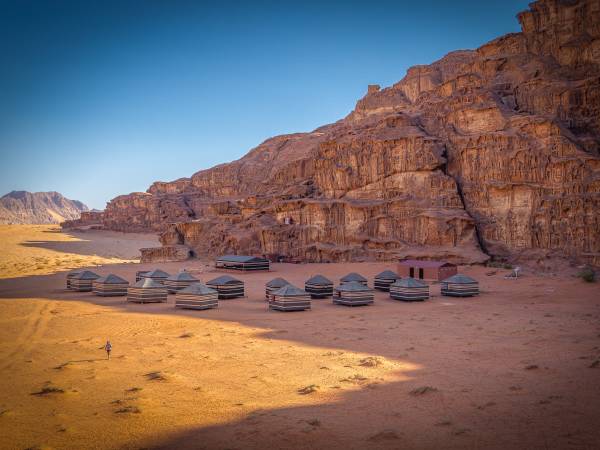
Just like the trip itself, the accommodation is delightfully varied. We stay in four different properties run by Jordan’s Royal Society for the Conservation of Nature (RSCN): in Ajloun Forest Reserve, Azraq, at the Dead Sea and in Dana village. These are unique places to stay and support nature reserves and local communities. Typically, we use three-star hotels in Amman, Petra and Madaba. We also spend a night in our private Bedouin camp in Wadi Rum, a truly memorable experience.
Amman: Hotel Khan Khediwe (nights 1-2)
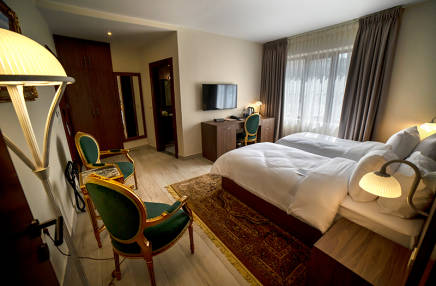
In Amman, we usually stay at Khan Khediwe, a three-star hotel in the bustle of downtown Amman. It’s ideally placed for our adventures, close to a market and within walking distance of the Roman amphitheatre and shopping areas.
Ajloun: Ajloun Cabins (night 3)
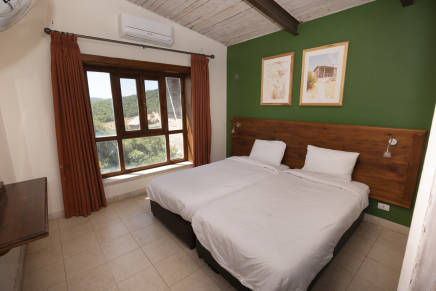
In the Ajloun Forest Reserve, the RSCN’s Ajloun Cabins are surrounded by pistachio, oak and strawberry trees. This peaceful location is very convenient for Ajloun Castle and Jerash. The restaurant serves typical local dishes.
Azraq: Azraq Lodge (night 4)
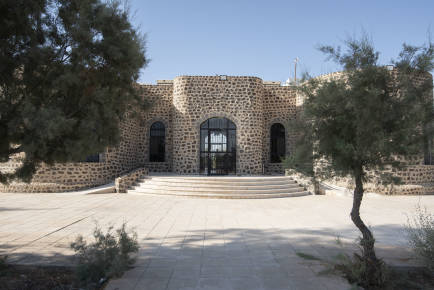
RSCN-run Azraq Lodge is partly a former 1940s British field hospital and partly modern brutalist accommodation blocks. The lodge staff are from the local community, which includes Chechen, Druze and Bedouin people. The buffet dinner often features Chechen dishes.
Dead Sea: Mujib Chalets (night 5)
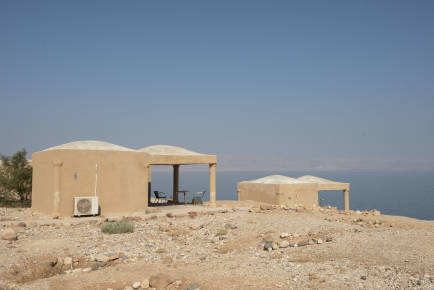
Another RSCN property, the Mujib Chalets are right on the shore of the Dead Sea. This is a peaceful area away from the Dead Sea resorts further north and a relaxing float in the sea can be enjoyed right from the chalets’ own beach.
Wadi Rum: Exodus Private Camp (night 6)
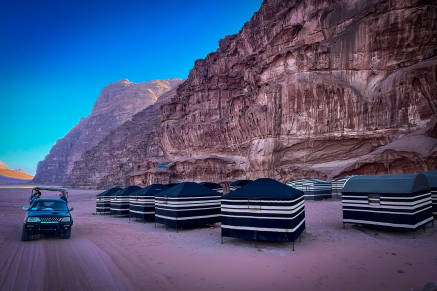
Used exclusively by our groups, the permanent Bedouin camp in Wadi Rum is a highlight for many travellers. We sleep in traditional tents sheltered by rugged stone cliffs and enjoy the warm hospitality of our Bedouin hosts. In the evening, they serve us a zarb dinner, cooked underground in the traditional manner, while the rest of the night is typically spent around the campfire, chatting and sharing an unforgettable experience.
Petra: (nights 7-9)
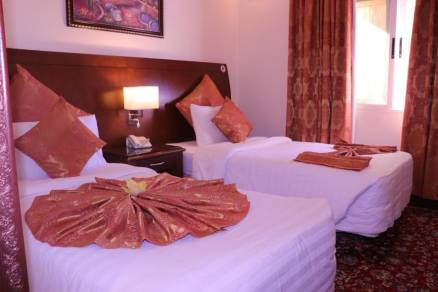
We spend three nights in Wadi Musa, the town adjacent to Petra. Demand for rooms near Petra is very high; over the years, we have built relationships with several accommodations, which allows us to secure spots even during peak season. The hotels are modest but well located. Some are within walking distance of the main entrance to the Red Rose City, others are no more than a 10-minute transfer away. Places we stay include Edom Hotel, Petra Plaza, Petra Palace, Amra Palace and La Maison among others.
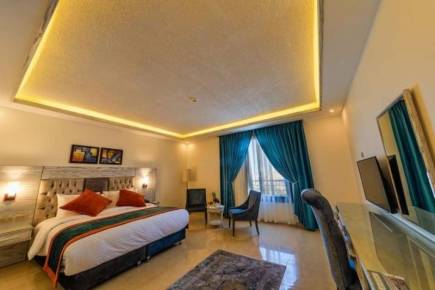
On a small number of departures we use a Superior (four-star) hotel in Petra. These departures are identified in the Dates & Prices section as ‘Superior hotel in Petra’. The hotel we usually use on these departures is the Petra Canyon Hotel (above), which is about a 10-minute drive from the entrance to Petra.
Dana village: Dana Guesthouse (night 10)
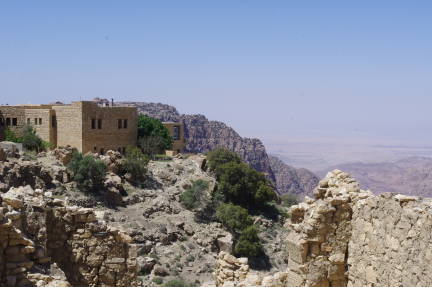
The final RSCN property of our trip, the Bedouin-run Dana Guesthouse has a beautiful location on the side of a cliff overlooking Wadi Dana. There are pleasant walks through the village straight from the door.
Madaba: Black Iris II (night 11)
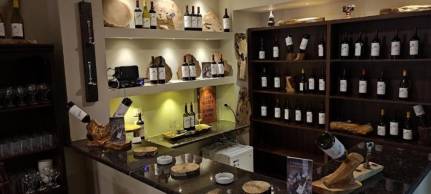
Modest but well run, the Black Iris II has modern rooms, a bar and outdoor seating area. The restaurant serves excellent typical Jordanian food.
Worth knowing
- Demand for accommodation in Petra is high; this can create problems with hot water and plumbing. In general, the accommodation here is more basic compared to the rest of this trip and service levels are variable.
- Single supplements are available for this trip but are not applicable at Wadi Rum.
Single supplement from £ 435
Food & Drink
For the meals that aren’t included we usually eat in local restaurants and the leader arranges bookings for those in the group who would like to join. We suggest you budget around 20 Jordanian dinars (US$28) per non-included meal. If you are vegetarian, please note that main meals are limited in choice; however, meze is almost always available in restaurants and is a good, filling vegetarian choice. There is a good selection of seafood available by the Red Sea. At the Wadi Rum camp, we enjoy a traditional dinner called zarb, which is cooked underground. This consists of rice with a selection including chicken, lamb and vegetables. Vegetables are cooked separately from the meat.
Alcohol is available in Jordan, but not widely. Many hotels do not sell alcohol but will often allow it to be brought in from elsewhere. It is best to plan ahead if you’ll want a drink, your tour leader will be able to tell you what’s possible and may be able to arrange a stop at a supermarket or liquor store (depending on location). In Petra, the unique Cave Bar in Petra Guesthouse is open to the public. A less expensive option is the bar in the Petra Palace Hotel which is also open to all.
Transport
For most of this trip, we use one air-conditioned bus with local drivers. To reach the Wadi Rum camp and to explore the desert of Wadi Rum, we use basic 4WD vehicles owned by the host Bedouin family. The vehicles are appropriate for local desert travel but may fall below normal vehicle safety standards expected on our trips, and do not have seatbelts. As there are no other vehicles available, and as we are not travelling by road, we feel they are an adequate means of transport.
Weather & Seasonality
Spring and autumn are popular in Jordan as it is cooler – around 24C (75F) in the day and 8C (46F) at night. Rain is likely, but protracted bad weather isn’t. It is hot and dry, but not unpleasant, throughout Jordan in the summer. Daytime maximum temperatures are around 32C (89F) in Amman. Jerash temperatures are the same.
Wadi Rum on average in summer is around 30C (86F) though it can get as high as 40C (104F). At night, it is usually around 10C (50F) cooler. In winter, it is much cooler, reaching as low as 10ºC during the day. In the evening it is around 0C (32F). There are occasions when there is rain or even snow in the desert. If weather conditions require, we may need to modify the itinerary or the camp location for your comfort and safety.
Aqaba is very hot when the air is still, but there is usually a breeze. Rain is unusual but possible. The Dead Sea air temperatures vary from around 14C (57F) in winter, nearing 40C (104F) in summer. The water temperature doesn’t drop below 20C (68F).
As with many countries in the world, seasons can go on longer than usual, so it is advisable to always check the weather of the country you are travelling to a week or two before your trip so you can pack appropriately.
Joining Instructions
Key information
Recommended arrival time: Hotel check-in is from 2pm, you can arrive at any time on Day 1. Our welcome briefing takes place on the morning of Day 2.
Airport: Queen Alia International Airport (AMM)
Getting to the start hotel
The start hotel is approximately 40 minutes’ drive from the airport. Exodus provides free arrival transfers to the start hotel from the airport for all customers.
Catching your return flight
Exodus provides free departure transfers for all customers to Queen Alia International Airport (AMM) from the end hotel.
Please note, unless specified otherwise, the transfers will be to the start (or pre-tour) hotel and from the end (or post-tour) hotel; transfers to other hotels in the same city and/or on different dates may attract an extra charge. Transfers should be booked with your sales representative at least two weeks before the tour starts.
Full joining instructions including local emergency numbers will be sent to you as part of our Final Joining Instructions. If you do not receive these at least a week before departure, or require them earlier please contact our office or your travel agent.
Location start: Amman
Location end: Madaba
What To Take
Essential Equipment
- Day sack
- Lightweight walking boots/shoes for Petra
- Sports bottle with wide top (not plastic) for water refills from large containers
- Sunhat
- Sunblock
- Swimwear for the Red and Dead Seas
- Insect repellent for the night at the desert camp
- Torch (flashlight) for desert camp
- Appropriate footwear for the Dead Sea as parts are rocky underfoot
You will encounter a range of temperatures on these trips; in spring and autumn the days are generally quite hot (very hot in July and August), the nights are cool in the desert. Light cotton clothing is suitable for daytime use, but you may need a sweater, and for departures from the end of September onwards you should also bring a warm jacket.
Please note, Jordan is a Muslim country and so modest dress is required on this trip when visiting holy sites and rural areas (ie legs, shoulders and upper arms should be covered). In the larger cities and more popular destinations this is not necessary.
Please try to bring no more than one main piece of luggage per person. On occasion luggage may be transported separately to the vehicle the group travels in.
Water included: Plastic bottles are a big issue in many countries where recycling isn’t yet widely available; they often end up in landfill or get burned. Both processes are harmful to the environment and we would like to reduce our impact here. For your trip, we provide an alternative to single-use plastic bottles to reduce the plastic used. This means that safe drinking water will be available throughout; all you need to do is bring a bottle to refill along the way. Please add this to your packing list.
Optional Equipment
- Travel towel for one night at desert camp
- Sleeping bag/liner for extra comfort for the night spent in the desert (please note that the basic bedding is already provided including sheets and blankets)
Practical Information
Passport
Jordan passport information
It is essential that we have your full passport details at least two weeks before the start of your trip (or at the time of booking for late bookings). This is required for the free visa (see below for eligibility details) and additionally, has to be supplied in advance to the tourism police, hotels and sights we’ll be visiting. If we are not provided with accurate passport information in advance, problems may be encountered during the trip and you may incur extra costs.
Visa
Jordan
Visas are required by most nationalities and can be obtained at the border or Amman airport.
We will arrange a free visa (usually 40 Jordanian dinars) for travellers booking a tour and any pre-tour arrangements through us, provided we receive full passport and flight details at least two weeks before arrival.
You will need to pay for the visa if we do not have these details two weeks before arrival or you are making your own pre-tour arrangements (ie extra nights before the tour that are not booked through Exodus).
Our airport representative will meet and assist you with obtaining the free visa on arrival in Jordan at Customs & Immigration. They will be carrying an Exodus sign.
Vaccinations and Health
There are no mandatory vaccination requirements; however, polio, tetanus and typhoid vaccines are all recommended.
Middle East Respiratory Syndrome: There is evidence that Middle East Respiratory Syndrome coronavirus (MERS) is spread by contact with camels. This trip may include the option of a camel ride, or it spends time close to camels, which is undertaken at your own risk; we suggest that you visit the Travel Health Pro website which includes information about the virus.
Local Time
Jordan's time zone: Asia/Amman (UTC +03:00)
Electricity
Jordan's electricity: Plug types C (two round pins, European standard), D (three round pins), F (two round pins), G (three rectangular pins, UK standard), and J (three round pins) – 230V, 50Hz
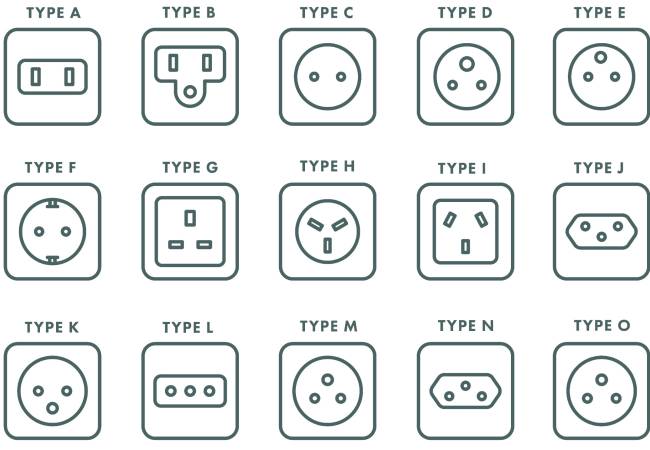
Money
Jordan's currency: Jordanian dinar (JOD)
ATM Availability
There are ATMs in the major towns and cities, such as Amman, Petra and Madaba. However, not all cards are accepted by the ATMs, so please bring cash to change if possible. Your leader can advise you on changing money and ATMs. Larger shops in the cities may take credit cards, but do not rely on this.
You can take your money in sterling or US dollars. You may want to take some in cash and some in travellers cheques, with a mix of denominations. However, we should point out that changing travellers cheques in Jordan can be quite difficult as very few places now accept these. If you do wish to take them, we advise using those issued by either Thomas Cook or American Express, as you may find others even more difficult to change. Small denominations are useful for times when you want to change a small amount of money outside the major towns or cities.
Extra Expenses & Spending Money
There are various excursions possible on this trip – the leader will provide more details on arrival. Please note that all prices are subject to change.
- Petra by Night: 30 dinars per person (US$43), which features 3D and hologram technology. Available Sunday to Thursday.
- Turkish bath: 22 dinars (US$31) per person
- Camel rides in Wadi Rum: camel rides provided by the local Bedouins may be possible in Wadi Rum. Around 1hr 20mins costs 20 dinars (US$28) per person
- Meal at a family home in Petra: 20 dinars (US$28)
Tipping
Our local staff are paid fairly for their work. However, while tipping may not be common in your home country, in Jordan it is part of the culture and is generally expected within tourism and many other areas of Jordanian life. We have given guidance in US dollars below, but tipping is best done in the local currency (Jordanian dinars).
For tipping your driver, hotel staff and other local staff, we recommend the use of a tipping kitty. Your leader can advise on the amount, as a guide, expect it to be US$85 for this trip. This kitty can be placed in the hands of one of the group members to look after and the leader will advise where it is appropriate to tip. If preferred, however, the leader can manage this for the group. The kitty is there to ease confusion and embarrassment by not knowing how much or how little to tip.
Most clients also wish to tip their Tour Leader and as a guide we suggest US$55 per person for this trip. Most groups prefer to present the money to the leader at the end of the week in an envelope. The amount is at your discretion and our suggested amount is to be used as a guideline only.
Sustainability and Impact
As a certified B Corp, we’re on a mission to improve our social and environmental impact across all our adventures.
We do this through our innovative Thriving Nature, Thriving People plan.
This ‘nature positive’ approach is designed to help nature and communities thrive in harmony through practical solutions, such as reducing carbon and waste on our trips, supporting conservation projects through the Exodus Adventure Travels Foundation, and rewilding 100 square metres for every Exodus traveller.
This trip goes near an area deemed unsafe to visit by the UK government’s Foreign, Commonwealth and Development Office, whose advice we follow when operating our trips. While our itinerary doesn’t go to these areas, you should familiarise yourself with your local government’s advice if you are planning any pre- or post-trip travel. Any independent travel to areas currently against your local government advice is entirely at your own risk and unlikely to be covered by your travel insurance.
Important Information
Your Safe Participation
When booking this trip, you should be confident in your ability to participate in all activities described in these Trip Notes. If you have any doubt about your suitability, please call us and ask to speak to one of the experts on this itinerary.
Although our leaders are well trained to deal with different capabilities, if they have any concerns about someone’s ability to safely take part in an activity, or their impact on other people’s enjoyment, we authorise them to take necessary action which, in some circumstances, may involve asking someone to miss that activity.
By booking this trip you agree to our Booking Conditions which clearly state that our leaders have the authority to do this. In these rare instances we will ensure anyone sitting out is safely provided for and offered alternative options where possible. Refunds will not be provided for activities missed and customers may be liable for additional costs incurred.
Seatbelts
All vehicles used by us should be equipped with working seatbelts, except where approved by us based on the vehicle type or journey. Wherever seatbelts are available, we require our customers to use them for their own safety, even where it may not be a legal requirement.
Travel Safety
For additional information please have a look at the travel safety advice page on our website.
How to Book
Speak to our friendly team of experts to plan your adventure:
- Check availability: our website shows real-time availability of our guided group tours, or contact our team by phone, email or live chat.
- Hold a space: You can provisionally hold a space on any guided group tour to give you time to finalise your travel plans.
- Confirm your booking: Payment of a deposit will complete your booking and secure your place on the trip.
After booking
You will receive a confirmation document and invoice, which includes extra information and guidance about your travel arrangements. Our dedicated Customer Operations team will help you with any pre-travel questions or arrangements and can easily add extensions or extra accommodation to your booking. Final Joining Instructions will usually be sent out two to three weeks prior to departure.
Adding transfers to your booking
If you have arranged your own flights and would like to add transfers to your booking, please provide your arrival and departure details to our Customer Operations team around four to six weeks before departure.
- Where free transfers are included, they are available for any flight but can only be added to your booking once we have received your flight schedule.
- Where group arrival and departure transfers are available, these operate at fixed times. You will need to arrive in time to meet the scheduled transfer. If the timings don’t align with your travel plans, our team can arrange private transfers once they receive your flight schedule.
Trip Note validity
Trip notes may be updated after booking; if any updates significantly impact the inclusions or itinerary you will be advised in writing. A link to the most up-to-date Trip Notes will be sent out with your Final Joining Instructions before departure.
The information in these Trip Notes is given in good faith. All holidays can be subject to unexpected changes, and occasionally it may not be possible to follow the itinerary as planned. In these circumstances we will make the best-possible alternative arrangements that maintain the integrity of the original itinerary.

